CC primed for take-off
Parliament approves civil society nominations :
by Uditha Kumarasinghe
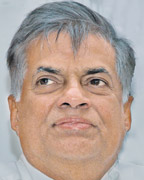 |
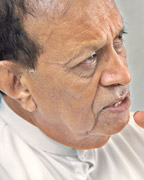 |
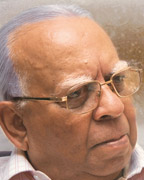 |
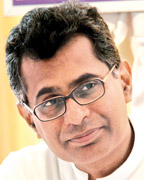 |
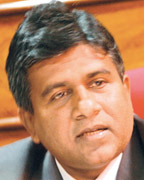 |
| Prime Minister
Ranil Wickremesinghe |
Speaker Karu
Jayasuriya |
Opposition Leader
R.Sampanthan |
Minister Patali Champika
Ranawaka |
Minister Dr. Wijeyadasa
Rajapakshe |
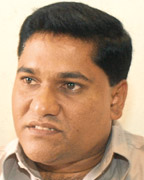 |
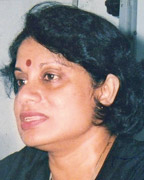 |
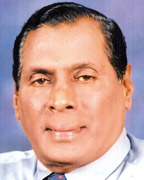 |
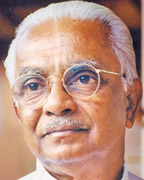 |
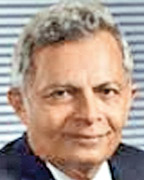 |
| JVP MP Vijitha
Herath |
Dr. Radhika
Coomaraswamy |
Minister W.D.J.
Senewiratne |
Dr. A. T. Ariyaratne |
Shibly Aziz PC |
The National Unity Government’s genuine desire towards strengthening
the democratic foundations took another step forward with the formation
of the 10-member Constitutional Council (CC) to urgently reactivate the
11 independent commissions that come under its purview, ensuring
independence to key institutions including Police, Bribery and Election
Commissions.
The reactivation of the CC has taken a new turn in Sri Lanka’s
democratic structure, which was at a standstill over the past several
years due to the non-functioning of several independent institutions
that had been confined to mere names. The CC was first introduced by the
United National Party (UNP) Government under the 17th Amendment to the
Constitution in 2001 to ensure more transparency with the creation of a
Council with representation from the executive and legislative branches,
the government, political parties, and the public.
However, the Mahinda Rajapaksa Government in 2010 replaced the 17th
Amendment with the 18th Amendment, establishing the Parliamentary
Council, which was no longer an authoritative body but merely one that
only had the power to nominate members to the independent
commissions.When the CC was first introduced in 2001, many including
professionals and civil society members welcomed the move hoping that
the independence of vital institutions would be preserved. However,
under the former UPFA Government, the functions of independent
institutions such as the Human Rights Commission became obsolete.
Despite the presence of the Parliamentary Council, it was former
President Mahinda Rajapaksa who had the final say over the appointments
of his own political appointees to key positions of these independent
bodies. President Maithripala Sirisena promised to re-introduction CC to
ensure the independence of 11 key institutions which comes under its
purview - the Elections Commission, the Public Service Commission, the
National Police Commission, the Audit Service Commission, the Human
Rights Commission, the Commission to Investigate Allegations of Bribery
or Corruption, the Finance Commission, the Delimitation Commission, the
National Procurement Commission, the University Grants Commission and
the Official Languages Commission. Parliament on April 28 this year
passed the landmark 19th Amendment to the Constitution with an
overwhelming majority to prune the draconian powers of the Executive
Presidency and also to set up independent commissions under the CC to
depoliticise major arms of the State such as the judiciary, bureaucracy,
Police and the Elections Commission.
The 10-member Constitutional Council appointed under the 19th
Amendment to the Constitution consists of Speaker Karu Jayasuriya, Prime
Minister Ranil Wickremesinghe, Opposition Leader R.Sampanthan, Ministers
Patali Champika Ranawaka (nominated by President Mathripala Sirisena to
represent the Head of State), Dr. Wijeyadasa Rajapakshe, W.D.J.
Senewiratne and JVP MP Vijitha Herath and three civil society
representatives. The names of three civil society members to the council
- Dr. A. T. Ariyaratne, founder, Sarvodaya Movement, Dr. Radhika
Coomaraswamy, former Under-Secretary-General of the United Nations,
Special Representative for Children and Armed Conflict and Shibly Aziz,
President’s Counsel were approved by Parliament on Tuesday (September
22) completing the formation of the ten member CC.
CC composition
Originally, the composition of the CC comprised seven independent
members belonging to the civil society and three Members of Parliament.
However, many UPFA members opposed the composition, fearing that the
UNP’s tenure in the opposition had created a strong link between the
party and civil society. The UNP, which categorically rejected such
claims stated that the appointment of the members of civil society to
the Council would only go ahead following approval by Parliament.
However, in order to ensure the passage of the 19th Amendment, then UNP-led
minority government was forced to change the composition of the CC to
seven Members of Parliament and three civil society members.
Criticism has emerged over the composition of the Council, with some
political analysts arguing that MPs who hold ministerial portfolios
should not be elected as members of the Council. Critics say that since
Patali Champika Ranawaka and Wijeyadasa Rajapakshe are ministers in the
current Cabinet, it would open avenues for accusations of political
interference. When the Motion was moved on Tuesday (September 22) to
seek Parliament’s approval to appoint the three civil society members to
the CC, MEP leader and UPFA Colombo District Parliamentarian, Dinesh
Gunawardena, raising a point of order demanded to know as to how two
Cabinet Ministers have been included in the CC.
MP Gunawardena said when the 19th Amendment was brought before
Parliament for approval, it was stated that the CC would not include
members of the Cabinet, to maintain its independence from the Executive.
That has been changed with the appointment of two members of Cabinet to
the CC. The MP demanded an explanation from the government as to how it
changed from its previous position. The inaugural meeting of the CC was
convened on September 10 under the patronage of Speaker Karu Jayasuriya.
At their meeting, the Speaker stressed the need to quickly constitute
the Council and begin appointment of members to the Commissions. After
completing the appointment of its ten members, the CC reconvened at the
Parliamentary complex on Wednesday (September 23).
The main function of the Council is to recommend suitable persons for
the position of Chairperson or members of the independent commissions
coming under the purview of the Council. No person shall be appointed by
the President to any of the offices of the 11 commissions unless such
appointment has been approved by the Council upon a recommendation made
to the Council by the President.
Main function
In the discharge of its functions relating to the appointment of
Judges of Supreme Court and the President and Judges of the Court of
Appeal, the Council shall obtain the views of the Chief Justice, the
Minister in charge of the subject of Justice, the Attorney General and
the President of the Bar Association of Sri Lanka. The Council shall
meet at least twice every month, and as often as may be necessary to
discharge the functions assigned to the Council and such meetings shall
be summoned by the Secretary General to the Council on the direction of
the Chairman of the Council. The Council shall once in every three
months, submit to the President a report of its activities during the
preceding three months.
Subject to the provisions of Article 126, no court shall have the
power or jurisdiction to entertain, hear or decide or call in question,
on any ground whatsoever, or in any manner whatsoever, any decision of
the Council or any approval or recommendation made by the Council, which
decision, approval or recommendation shall be final and conclusive for
all purposes.
|

